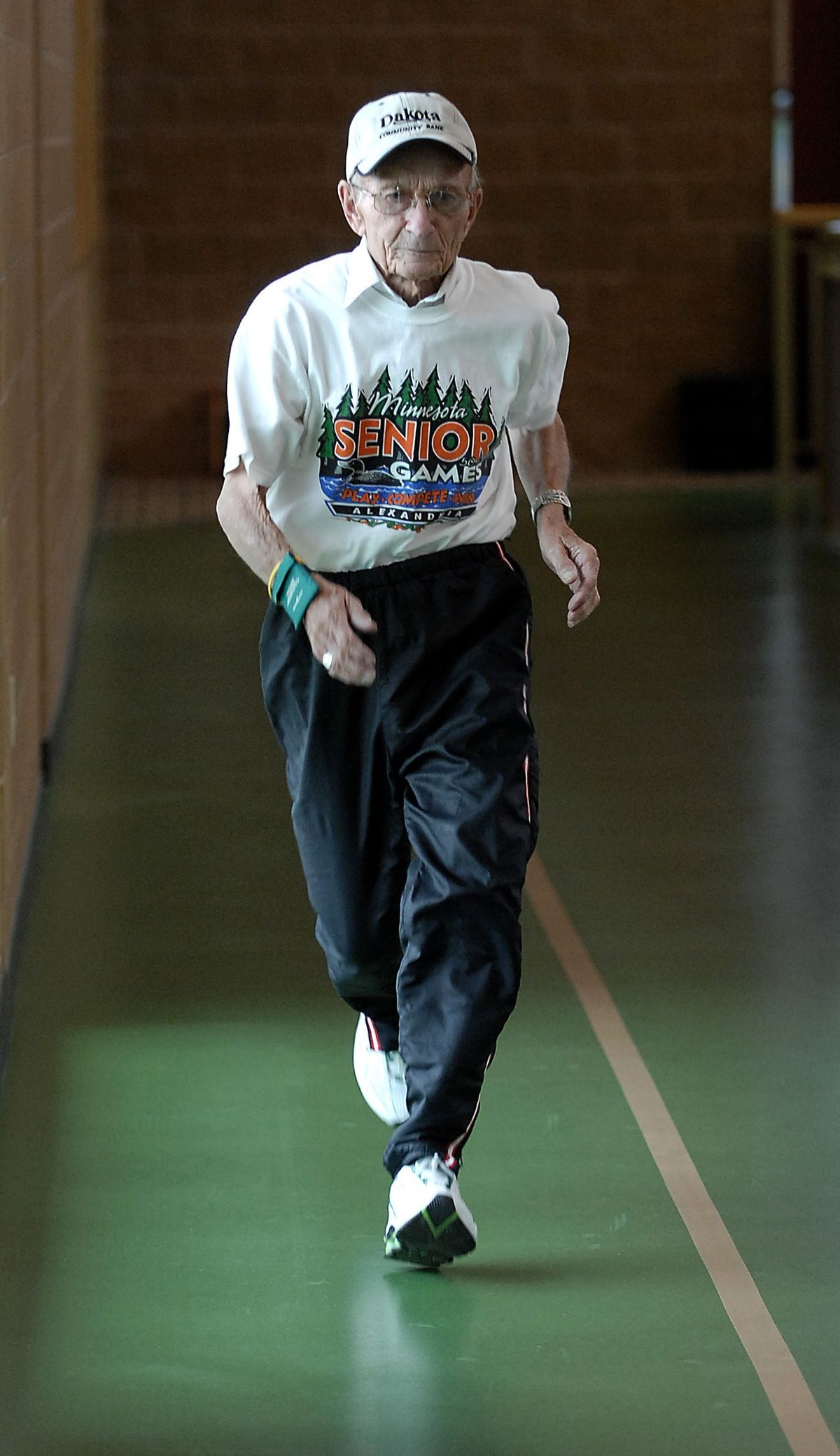Aging Olympic athletes are still striving for that gold

At age 89, Harold Bach is preparing to do battle with the whippersnappers in the low end of his age group – the one that starts at 85.
“I’m on the bad side of the bracket,” says Bach, a retired mail carrier and World War II veteran from western North Dakota.
Even so, Bach has been training hard for the 2009 Summer National Senior Games in San Francisco, which begins today and runs until Aug. 15.
The events are open to men and women 50 and over who qualified in state competitions.
A record number of athletes are expected this year – a projected 12,750, more than five times the number at the first event 22 years ago. More than 2,700 of the athletes are ages 70 to 89, and 63 are older than 90.
“It keeps me young,” says Roger Gentilhomme, 100, of Falmouth, Mass., the oldest participant at the Games, which are held every two years.
“My health is excellent and I’m fortunate to be able to compete,” adds Gentilhomme, who’ll participate in bowling and tennis.
The National Senior Olympics Organization, now called the National Senior Games Association, was founded in St. Louis in 1985. The first Games’ ceremonies two years later featured Bob Hope and drew more than 100,000 spectators.
There are 18 medal sports – including archery, horsehoes, and track and field – and seven demonstration sports, such as fencing, sailing and water polo.
Competition for the Games ranges from friendly to fierce. Some of the athletes would “step on your mother for a quarter,” says Anne Warner Cribbs, president of the local organizing committee.
Cribbs was a gold medalist on the U.S. women’s 400-meter relay swimming team at the Rome Olympics in 1960.
“It’s a lot of camaraderie, a lot of competition and a lot of good stories,” she says. “It’s a lot of things to a lot of people, but the overarching thing is really about the benefits of health and exercise.”
Boomer fitness has become a growing trend as people over 50 embrace exercise as a preventative health care measure.
“Younger people want to work out to look 15 years younger,” says Pete McCall, an exercise physiologist with the American Council on Exercise, who coaches octogenarians. “Older people exercise to be able to go to the store, work in their gardens, or play with their grandkids.”
Healthways Inc.’s SilverSneakers program, which gives insured seniors free access to fitness centers in the U.S., has 900,000 members, a marked jump from 377,000 in 2006, according to spokeswoman Tricia Grayson.
The average age of a person in the program is 72, and 17 percent of participants are over 80 years old, she says. At least one member is 101.
In an aging population, physical fitness is worth a little boasting.
Lillian R. Webb, 94, of Sebring, Fla., brags that her lungs are “perfect” despite a cigarette smoking habit that began in 1934.
She has competed in nine of the 11 previous Senior Games, and has won hundreds of medals in various senior competitions, giving most of them away to nursing home residents. She lives alone and drives to the local health club to work out.
“I feel the same way I felt when I was a kid,” says Webb, who is competing in bowling and track and field events this year. “It just takes me a little longer to get up if I’m in a low chair.”
North Dakota’s Bach, a cancer survivor and former smoker, picked up running when he was 72 and has racked up more than 100 medals. He runs at least a mile each day and works out at the local gym six days a week.
His wife, Evelyn, 83, says her husband is as fit as the day she met him nearly 70 years ago. His nephew, Sen. Byron Dorgan, D-N.D., calls him an inspiration.
At 5 feet 3 inches and 115 pounds, Bach has the stride of someone a fifth his age, completing the 100-meter dash in just over 17 seconds. His 200-meter time is about 34 seconds.
“Most good runners are tall and I’m short, but I get out of the blocks fast,” Bach says. “If they’re going to beat me, they got to go by me. And those tall runners have big feet so I can hear them coming.”
He and his fellow sprinters were a little intimidated at one meet when one of their rivals showed up at the starting line wearing a flashy sweat suit and expensive running shoes.
“He had the look of a fast athlete,” says Bach.
But when the starting gun fired he just stood there: “Evidently, he was hard of hearing and didn’t hear the gun go off.”